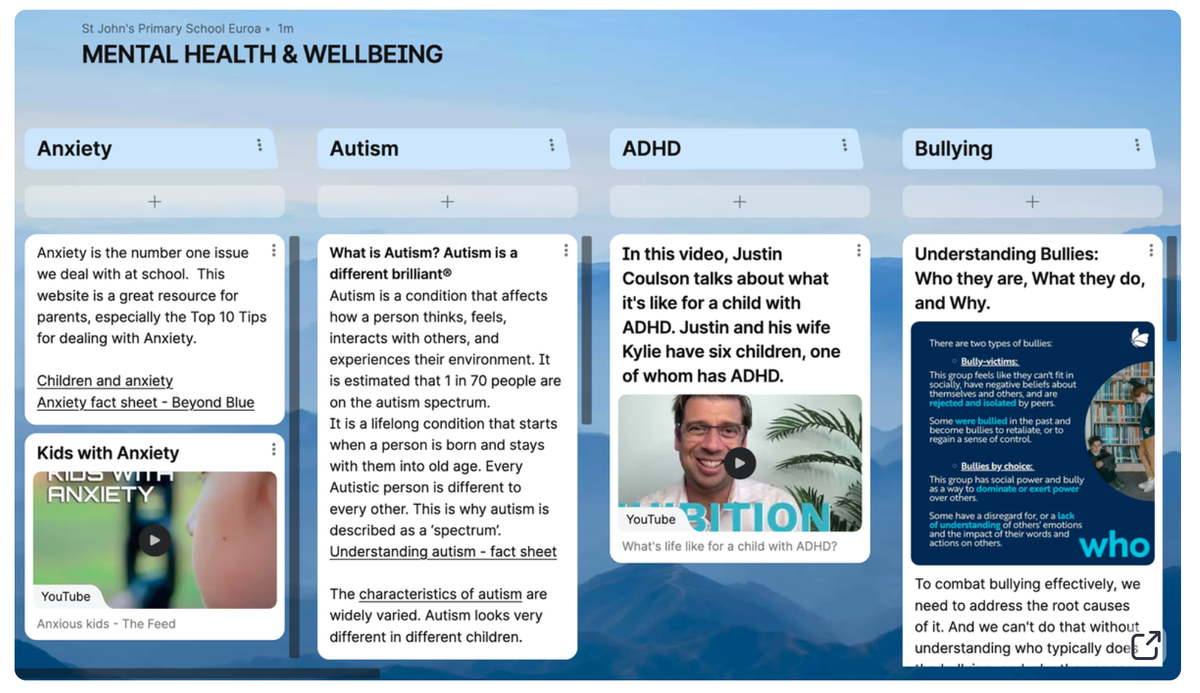Mental Health in Primary Schools: DIET AND LEARNING

Ally Johnston
Mental Health in Primary Schools Leader
The Impact of Diet on Primary School Students’ Behaviour and concentration
Diet plays a crucial role in shaping a child’s energy levels, concentration, and overall behaviour in the classroom. The foods children consume directly impact their ability to stay engaged, regulate emotions, and perform academically.
Energy Levels and Learning
Children need a steady supply of energy to stay alert and participate in learning activities throughout the school day. Foods high in refined sugars, such as lollies, soft drinks, and processed snacks, provide a quick burst of energy but often lead to a crash, leaving students feeling tired, irritable, and unfocused. On the other hand, complex carbohydrates like whole grains, fruits, and vegetables provide a slow, steady release of energy, helping children sustain their attention for longer periods.
Foods That Support Focus and Behaviour
Some foods are particularly beneficial for brain function and concentration:
- Protein-rich foods (eggs, lean meats, nuts, dairy, and beans) help maintain stable energy levels and support brain function.
- Healthy fats (found in avocados, nuts, seeds, and oily fish) are essential for brain development and memory.
- Fruits and vegetables are packed with vitamins and minerals that improve cognitive function and help children feel their best.
- Whole grains (brown rice, oats, wholemeal bread) provide lasting energy without sudden sugar crashes.
Hydration Matters Too
Dehydration can lead to fatigue, headaches, and difficulty concentrating. Encouraging children to drink enough water throughout the day can improve their mood and focus in class.
By promoting a balanced diet rich in whole foods, teachers and parents can help students maintain steady energy levels, regulate their behaviour, and optimise their learning potential. Simple dietary changes can lead to a noticeable improvement in engagement, focus, and overall wellbeing in the classroom.
Dr. Michael Carr-Gregg, a leading Australian psychologist, often emphasizes the significant impact of diet on children's mental health, behaviour, and learning. He highlights the strong link between nutrition and brain function, stressing that poor eating habits can contribute to issues like anxiety, mood swings, and difficulty concentrating in school.
Key Points from Michael Carr-Gregg on Diet and Children's Behaviour:
- The Importance of a Healthy Diet
- He advocates for a diet rich in whole foods, including fruits, vegetables, lean proteins, and whole grains, to support brain development and emotional regulation.
- He warns against processed and high-sugar foods, which can lead to energy crashes, poor concentration, and increased behavioural issues.
- Impact of Sugar and Processed Foods
- Carr-Gregg explains that excessive sugar intake can contribute to hyperactivity, mood swings, and difficulties with self-regulation.
- He also discusses the negative impact of artificial additives, preservatives, and fast food on children's ability to focus and manage their emotions.
- The Role of Omega-3 Fatty Acids
- He highlights the benefits of omega-3 fatty acids (found in fish, nuts, and seeds) for cognitive function, concentration, and emotional stability.
- Breakfast is Essential
- Carr-Gregg stresses the importance of children starting the day with a nutritious breakfast. Skipping breakfast can lead to low energy levels, poor concentration, and irritability in the classroom.
- The Gut-Brain Connection
- He often speaks about the link between gut health and mental health, recommending probiotic-rich foods (like yoghurt) and fibre to support digestion and overall wellbeing.
- Hydration and Mental Performance
- Dehydration can lead to fatigue, headaches, and difficulty concentrating. He encourages parents to ensure their children drink enough water daily.
Carr-Gregg consistently promotes the idea that small changes in diet can lead to big improvements in children's mood, behaviour, and academic performance. His advice encourages parents and schools to focus on nutritious, balanced meals to support children’s mental and physical development.
Click to access past resources



